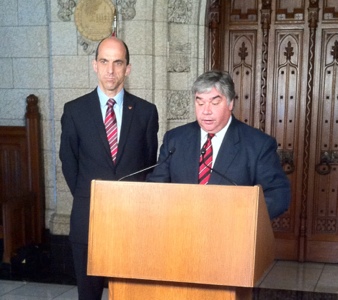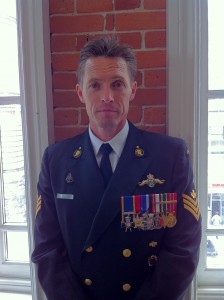The usual Friday schedule had been abrogated, and the Chamber fitted for a podium in front of the Speaker’s Dias, and the usual Hansard desks in the centre aisle taken out for VIP seating—most of those VIPs being the handful of senators who opted to stay the extra day and not fly home on Thursday night (owing in part to quirks in the Senate’s travel rules)—but some of Zelenskyy’s party, including his new defence minister. There were a surprising number of seat-fillers on the Conservative side of the aisle—staffers, spouses, a child or two—while there were some into Liberal benches, but not nearly as many.
When things got underway in earnest, well behind schedule, the deputy Speaker gave a five-minute warning as he has made a habit of doing over the previous speeches. When Speaker Rota took his place, he noted that this was Zelenskyy’s second address to this Chamber, and that they are celebrating friendship and solidarity.
https://twitter.com/aballinga/status/1705273581016346978
Justin Trudeau took to the lectern first, and he spoke about the attacks on the international rules-based order, and why it was important to host Zelenskyy. He noted the start of the invasion, and the inspiring courage of the Ukrainian people in fighting for their freedoms. He noted that he had had a change to speak to Ukraine’s parliament, and was happy to see the Canadian flag in that Chamber. He mentioned some of the things they spoke about—nuclear hostage-taking at the Zaporizhzhia nuclear plant, and the ecocide of the burst dam. Trudeau spoke about seeing the bombed-out neighbourhoods in Kyiv, and the haunted look in the eyes of the people there. He noted the funding for support for mental health care in Ukraine, and of the First Lady’s championing that cause. He noted the blocked grain exports causing suffering in other countries, and that Zelenskyy is holding the rules-based order in the balance. He called Putin’s action a “break with civilisation,” to weaken democracy and assert autocracy, but that Ukraine has held against his imperial ambitions. He noted the populists who give rise to demagoguery and the rise of disinformation, but that rules will protect us, but we need to stand up for them and live by them.
“History will judge how we defend democratic values, and Ukraine is at the tip of that spear,” Trudeau said.
After noting some of the Ukrainians who fled the war in the Chamber with us, and that some were scientists leading the way on the clean economy, and others were Ukrainian-Canadians leading the charge to help those from their original homeland. He announced a new longer-term agreement on stable and predictable aid for Ukraine, with more armoured vehicles built in London, Ontario, and for more trainers for Ukrainians. He spoke about the need for a real and durable peace and not just a false one that would allow Putin to re-arm, and so that Ukraine can determine their own future. This meant following Ukraine’s peace formula, which is what they just fight for. He gave another paean for the fight to defend democracy, and praised Zelenskyy for staring down Putin every day.
Zelenskyy took to the lectern, and once the applause died down, he spoke about how Edmonton hosted the first monument to the victims of the Holodmor in the world in 1983. At the time, Ukraine didn’t have their own monuments because they were still under Soviet control, and that a lot has changed since then, that Ukraine is restoring their own historic identity. What has not changed in that time, was that Moscow is bent on controlling Ukraine, including the use of genocide. He stated that this was not an ordinary conflict, but saving millions of lives, and that the destruction on their cities or villages must not go unpunished.
“This Russian aggression must end with our victory,” Zelenskyy declared. “Moscow must lose once and for all.”
Zelenskyy noted that justice is not an empty word in Canada, and that we don’t make political cause with hatred and enmity and that we are always on the right side of history. He praised Canada’s leadership, and stated that false neutrality is immoral. He thanked Canada’s support, not only just with military support but also with de-mining, the encouragement around sanctions, and training soldiers. He called Ukraine and Canada partners and friends, and noted our help with getting them off of their dependence Russian nuclear power technology, which Russia uses as a means of control. He noted Canada’s leadership in seizing Russian assets to help them rebuild, before taking about the importance of justice, particularly as a warning to other would-be aggressors. He thanked Canada for making those Ukrainians in our country feel at home, which is not just a legacy of history, but a legacy of character. After a few more parting words about freedom, and standing up to evil, he spoke about future monuments to their victory in this war, their common victory and the legacy of good. He mentioned his meeting with Mary May Simon.
“Justice is not an empty word for Canada,” says Volodymyr Zelenskyy in his address to Parliament. “You never, never, ever make a political bet on hatred and enmity. And you are always on the bright side of history,” says the Ukrainian president.#cdnpoli pic.twitter.com/4TKYvpmsAC
— CPAC (@CPAC_TV) September 22, 2023
“She taught me a word in her mother tongue—Ajuinnata,” Zelenskyy said in conclusion. “The meaning is don’t give up. Stay strong against all odds. Ajuinnata, Canada. Ajuinnata, Ukraine.”
“Ajuinata, Canada. Ajuinata, Ukraine,” says Ukraine President Volodymyr Zelenskyy as he addresses Parliament, citing the Inuktitut word for perseverance in the face of adversity, which he says Mary Simon, Canada’s Governor General, taught him. #cdnpoli pic.twitter.com/NGZyD8w0OM
— CPAC (@CPAC_TV) September 22, 2023
Senate Speaker Raymonde Gagne took to the podium, her first address as Speaker, and in French, she spoke about the honour of hosting them, and stated that Canadians have heard them. Switching to English, she spoke about the importance of role models, and that young people see the example that Zelenskyy sets to the world. She praised his iconic video of proclaiming himself here in Kyiv when the invasion began, and that he has remained steadfast in the time since, which was inspiration for the world. Her message for him to take back to Ukraine was that the Canadian people stand with Ukraine and aren’t going anywhere.
Speaker Rota closed out the event with a few remarks of his own, noting that Zelenskyy has joined a small group of those who have addressed Canada’s parliament a second time, and one of the only others to do so was Nelson Mandela. He quoted Mandela’s praise for Canadians, before raising Sir Winston Churchill’s address to Parliament during World War II. He noted the presence of a 98-year-old Ukrainian WWII veteran, who later fought to help Ukraine’s independence, who is also from his own riding. Rota noted that Ukraine’s parliament has not stopped sitting through the war, and that he has developed a friendship with its chairman, and that he has also conveyed what is at stake—not only Ukraine’s freedom, but the future of the rules-based order, which is necessary for the world to move forward. He vowed that Canada will continue to stand with Ukraine, before one last round of applause.
Overall, it was nice to see Zelenskyy in the House of Commons in person rather than by video, and something else that was different this time was that Zelenskyy spoke in English the entire time—the video address was almost entirely in Ukrainian and translated. It was also a better speech from Trudeau than when Joe Biden was here earlier in the year, while Zelenskyy’s speech was also better than Biden’s. For Trudeau, he was far less focused on applause lines and while he did point out a couple of people in the galleries, it was less obvious and gimmicky than when Biden was here, as though he were aping a State of the Union Address. Zelenskyy also wasn’t focused on those constant applause lines like Biden was, which made for better flow and frankly better impact overall.



